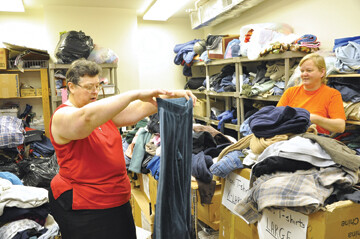
Manna House transforms lives in Charm City
BY JOHN COLEMAN
SPECIAL TO THE UMCONNECTION
 James Quickley, 60, has been coming to Manna House for its free breakfast and other services for the poor since the agency moved to its present home on 25th St. in East Baltimore 20 years ago.
James Quickley, 60, has been coming to Manna House for its free breakfast and other services for the poor since the agency moved to its present home on 25th St. in East Baltimore 20 years ago.
Quickley has eaten out of dumpsters, spent time in jail and lived on the streets of Charm City. But today he has an apartment, helps care for his 5-year-old daughter and con-siders himself to be "a much better person," all thanks to help from the Manna House staff.
"I've seen this place change a lot since I started coming here, and I've changed, too" he said. "I was hard-headed with a big mouth, but Ms. Lil (Lillian Lowensen, breakfast program coordinator) taught me some life skills and how to treat people honestly and deal with life on life's terms.
"The staff here helped me go through the process of getting my own place," he added. "I'm making it now, and I'm trying hard not to let them down."
One can find occasional success stories at Manna House, stories of once-homeless men who found homes, jobs and recovery from drug addiction; but there are far more ... well, success stories still waiting to happen.
In the meantime, Manna House, which began as a soup kitchen of the former Midtown Churches Community Association in 1973, is struggling, like all food aid programs, to feed more people with less money. That struggle comes astride recent news reports of a daunting increase in hunger across America, due to rising joblessness, food prices, poverty and homelessness.
Manna House, which depends on individual and church contributions, as well as public and private grants, is facing a 15 percent increase in clients and a 10 percent drop in donations, mostly from churches, since 2008.
"The churches are hurting for funds and so are we," said Saleem Gauhar, program director. "We're really scrambling to get money."
Manna House serves a hot, nutritional breakfast Mondays through Saturdays, where clients line up outside to enter a dining room that can seat only about 20 at a time. The agency feeds about 170 people a day, 90 percent men but also children and youth in the summer. It served about 50,000 meals in 2008, an increase of about 2,000 over the previous year, and it expects that total to increase in 2009.
The agency also runs an all-day drop-in center offering showers, clean clothes and personal hygiene items; job preparation and housing assistance; telephone calls and a mailing address; medical services, including HIV-AIDS testing and support; and referrals for clients seeking recovery from drug and alcohol addiction and mental illness.
Manna House will soon launch a new outreach program targeting barber shops and other local venues to offer health education, screening and referrals to racial/ethnic minority men at high risk for hypertension, diabetes and other chronic diseases. The program is funded by the city health department, and works in partnership with the American Heart Association. The new program is expected to reach an under-served and largely uninsured population that too rarely seeks the preventive medical care that it needs.
 Manna House's clientele is changing, according to Gauhar and Esther Reaves, the executive director for the past 20 years who is a member of Lovely Lane UMC.
Manna House's clientele is changing, according to Gauhar and Esther Reaves, the executive director for the past 20 years who is a member of Lovely Lane UMC.
While most are still homeless men, many dealing with addiction, there are more employed poor people coming to eat, shower, get clothes and save what little money they have for other basic needs. And while some, like Quickley, have been coming here for years, there are new and younger faces now, reflecting the changing face of poverty.
"There is economic poverty here, but the biggest problem for many is the loneliness and the lack of dignity and hope," said Gauhar, a volunteer for 16 years and program director for the last four. "We try to befriend them and let them know they can trust us, because poor and homeless people have to know you're for real and that you respect them. They can tell when you don't."
"Most people ignore homeless people or turn their head when they see them," added Reaves. "So looking them in the eye and showing them respect is the biggest thing we teach staff and volunteers."
Reaves began volunteering at Manna House through Lovely Lane UMC in 1984 and then recruited Gauhar after speaking at his church, Linden Heights UMC. The two have been a dynamic duo, along with Lowensen and other longtime staff and volunteers, in building up the program.
Manna House receives strong support from numerous United Methodist churches in Baltimore, around the conference and beyond. That support comes in the form of donated money, food, clothes and other materials, volunteers and in-kind services. A frequent source of volunteers is visiting confirmation classes that enable young people to participate in this vital ministry among the poor.
"If we can just get into more churches to speak and make a personal connection, there is so much more that Manna House and our conference can do together to fight poverty and hunger," said Gauhar, who, like Reaves, served on the conference's Commission on Evangelism for many years. "It's a partnership where everybody can win."
For more information on how your church can partner in ministry with Manna House, contact Saleem Gauhar at .Visit Manna House's Web site at www.mannahouseinc.org.

Login/Register to leave comment